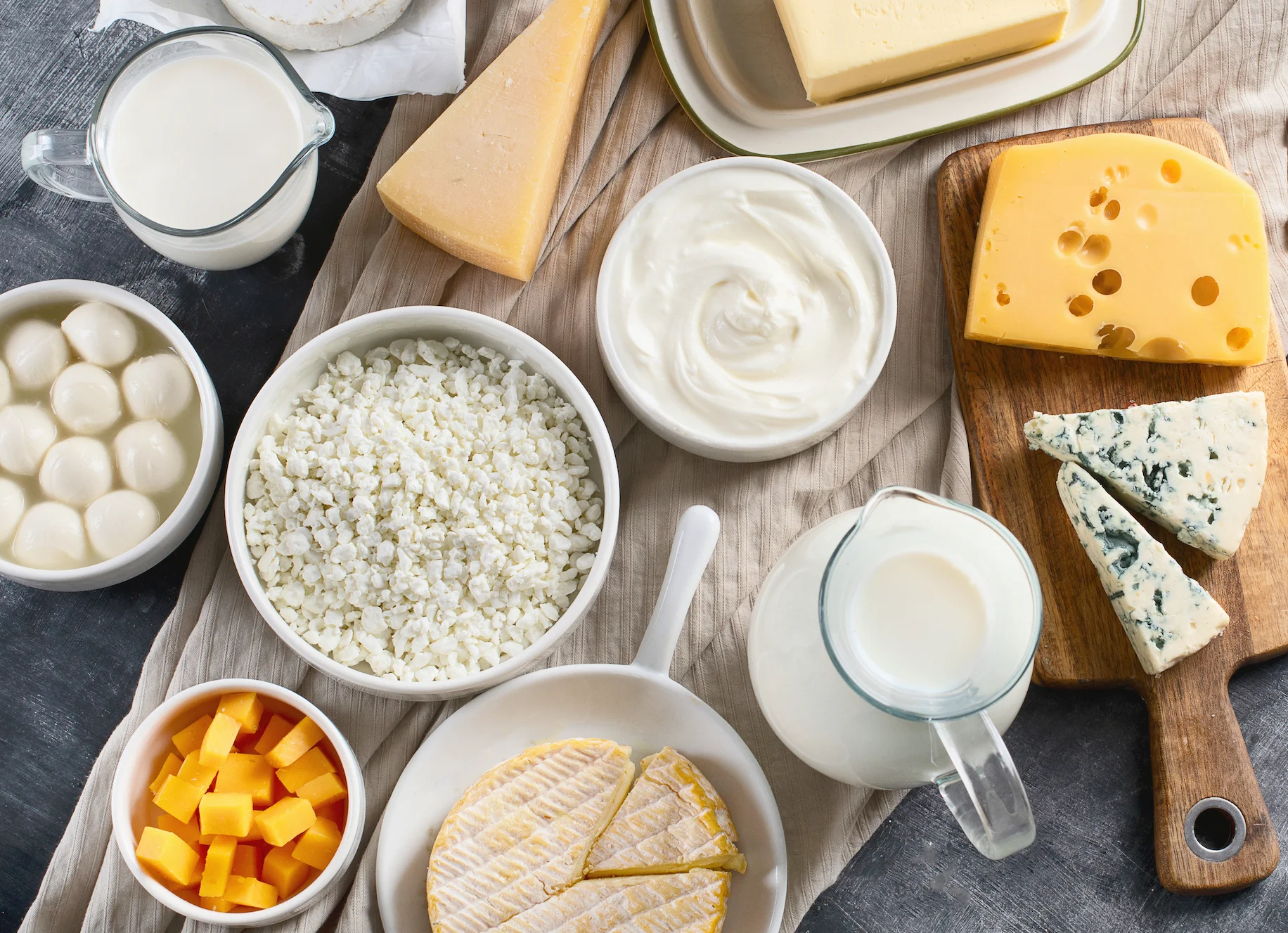
Key facts
- Dairy foods include products such as milk, yoghurt and cheese.
- They are rich in many essential vitamins and minerals, including calcium.
- Unpasteurised (raw) dairy products can be unsafe to eat and are more likely to contain bacteria.
What are dairy foods?
Dairy foods are products such as milk, yoghurt and cheese. Most dairy foods come from cow’s milk, although some are made from the milk of sheep, goats and other animals.
Dairy foods are rich in many essential vitamins and minerals, in particular calcium. As part of a balanced diet, dairy foods contribute to strong bones and help you stay healthy.
Dairy foods vary in fat content. For example, milk comes in ‘full fat’ (3.5% fat), ‘low fat’ (less than 1.5% fat) and ‘skim’ (less than 0.15% fat).
Why do I need dairy foods?
Dairy foods provide many nutrients, including:
- minerals such as calcium, iodine and zinc
- protein
- vitamins A, D, B12 and B2 (riboflavin)
Calcium is essential both for children and adults, as it helps to grow strong bones.
Dairy foods can also help reduce blood pressure, and the risk of heart disease, stroke and some cancers.
How to get more dairy in your diet
The recommended daily number of serves of milk, yoghurt and cheese (or alternatives) for a healthy diet will depend on a person’s age and sex. One serve of dairy is equivalent to:
- 1 cup (250ml) of milk
- ¾ cup (200g) of yoghurt
- 2 slices (40g) of hard cheese
- ½ cup (120g) of ricotta cheese
- 1 cup calcium-enriched soy, rice or other cereal milk (with at least 100mg calcium per 100ml)
Here are the recommended daily number of serves of milk, yoghurt and cheese (or alternatives) for a healthy diet.
Adults
- Women aged over 50 — 4 serves
- Pregnant women — 3 ½
- Breastfeeding women — 4
- Men aged over 70 — 3½ serves
- All other adults — 2 ½ serves
Children and adolescents
- Toddlers aged 1-2 years — 1-1½
- Girls aged 2-8 — 1-1½
- Girls aged 9-11 — 3
- Boys aged 2-3 — 1½
- Boys aged 4-8 — 2
- Boys aged 9-11 — 2½
- All teenagers — 3½
Babies up to 12 months should drink breast milk or formula, not milk from cows (or other animals). Dairy alternatives are not suitable as milk substitutes for children under 2 years of age.
Here are some tips for adding more dairy to your diet:
- Include cheese in sandwiches or wraps.
- Drink milk- or yoghurt-based smoothies.
- Sprinkle cheese on pasta.
- Dollop natural yoghurt on a jacket potato.
- Enjoy a warm glass of low-fat milk after dinner.
Alternatives to dairy
Some people avoid dairy because they:
- follow a vegan diet
- are lactose intolerant
- are allergic to a protein in cow’s milk
If you do not consume dairy, it is important to get the nutrition you need, especially calcium, from other sources. This is particularly important for children, who need plenty of calcium for their bones to grow properly.
It is a good idea to see a health professional, such as a dietitian or nutritionist, for advice and to find out whether you should take a calcium supplement.
Non-dairy sources of calcium include:
- calcium-enriched soy, rice and oat drinks (1 cup equals 1 serve of dairy)
- almonds (100g equals 1 serve)
- firm tofu (100g equals 1 serve, although it can vary between brands)
- tinned sardines (60g equals 1 serve) and salmon with bones (100g equals 1 serve)
- green vegetables, such as bok choy, kale and broccoli
- calcium-fortified breakfast cereal, bread or juice
Note that the calcium in green vegetables is not as easily absorbed by your body as the calcium in dairy.
Dairy and food safety
Pasteurisation is the process that kills potentially harmful bacteria found in raw milk and raw milk products. Pregnant women, the elderly and people with an impaired immune system should not eat unpasteurised dairy products (or soft cheeses, such as brie and ricotta), which are more likely to contain bacteria, including Listeria.
You should not give babies and toddlers unpasteurised milk.
Dairy food should be handled and stored following food safety guidelines. For example, keep it in your fridge at or below 5°C. Avoid consuming dairy foods after their ‘use by’ date — even if they smell or look all right.


